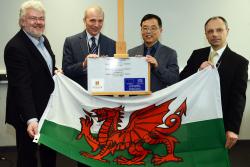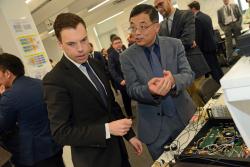Launch of a faster age at M-SParc
 At the Opening were ( left-right) Prof David Thomas, Pro Vice-Chancellor (Research & Impact) Robert Hoyle, Head of Science, Welsh Government, Prof Jianming Tang, Director DSP Centre & Prof Paul Spencer, Dean of the College of Natural Sciences & EngineeringA 5G research centre, which will make Wales a global leader in the technology and change how the internet works, will be officially launched at M-SParc, Bangor University’s Science Park today (23.1.20).
At the Opening were ( left-right) Prof David Thomas, Pro Vice-Chancellor (Research & Impact) Robert Hoyle, Head of Science, Welsh Government, Prof Jianming Tang, Director DSP Centre & Prof Paul Spencer, Dean of the College of Natural Sciences & EngineeringA 5G research centre, which will make Wales a global leader in the technology and change how the internet works, will be officially launched at M-SParc, Bangor University’s Science Park today (23.1.20).
The Digital Signal Processing (DSP) Centre is run by professors and researchers from Bangor University, who are working on speeding up broadband, and are playing a vital role in enabling true 5G. With partners including Huawei and BT, this is global work which could be world-changing.
The centre will provide highly specialised research into digital communications systems like mobile phones, WiFi hubs and modern manufacturing lines
The centre, backed by £4m EU funding provided by the Welsh Government, will look at ways to use existing fibre technology in the 5G network to improve capacity, flexibility, functionality and services.
M-SParc, Bangor University’s Science Park has become the location for the DSP Centre which will employ over 20 researchers during the lifetime of the EU funded project. Collaboration agreements will be signed with global players in the digital economy such as BT, Fujitsu and Huawei and leading Welsh companies such as TWI, FibreSpeed and Comtek.
Lee Waters AM, Deputy Minister for Economy and Transport will open the new Centre and said:
“This Centre of Excellence will contribute towards making Wales a global leader in 5G technology, putting the country at the very heart of innovation in this field.
“Improvements in DSP can speed up networks, and dramatically improve the way mobiles and other devices work, including autonomous vehicles.
“It’s great to see this world class research taking place here on Anglesey, backed by EU funding contributing to our goals of a more prosperous and equal Wales.”
 Ken Skates AM, Minister for Economy and Transport also called in and was shown the Centre and its work by Professor Jianming Tang, who is leading research at the Centre and who also lectures at the School of Computer Systems and Electronic Engineering.David Thomas, Pro Vice Chancellor of Research and Impact at Bangor University, who opened the event said:
Ken Skates AM, Minister for Economy and Transport also called in and was shown the Centre and its work by Professor Jianming Tang, who is leading research at the Centre and who also lectures at the School of Computer Systems and Electronic Engineering.David Thomas, Pro Vice Chancellor of Research and Impact at Bangor University, who opened the event said:
“This exciting new development is another example of how the excellent research at Bangor University, in this instance, from the School of Computer Science & Electronic Engineering is translating into real-world benefits, not only in improving the technology we will all be using in the future, but also in making a significant contribution to a greener future environment.”
Pryderi ap Rhisiart, Managing Director of M-SParc, said:
“This may not be the sort of technology people expect to see when they think of North West Wales, and that’s exactly why we established Menai Science Park. Work like this, on the cutting edge, can and does happen here. Many of our tenants are developing technologies and products that are the first of their kind, are award winning, and working with international partners, and we firmly believe the talent is here.”
Professor Jianming Tang, the project lead, noted:
“The research we will be conducting aims to meet the challenges of 5G mobile networks by seeking solutions to improve bandwidth provision, lower latency and increase connection density, and making the networks more elastic and adaptive.”
The DSP Centre is the first of its kind in the UK, and long-term has the potential to bring transformative economic benefits in an area of ground-breaking research. Over 10 years the intention is to create 100 jobs associated with the DSP.
Locating in M-SParc, and developing technology that reflects M-SParc’s low carbon focus for North Wales makes sense for another very topical reason. ICT is actually responsibly for up to 4% of total global carbon emission, and this will only increase unless significant changes are made to reduce the carbon footprint. The DSP centre’s work on expanding the capacity and wireless access technology could reduce network power consumption by 90%.
Publication date: 23 January 2020
